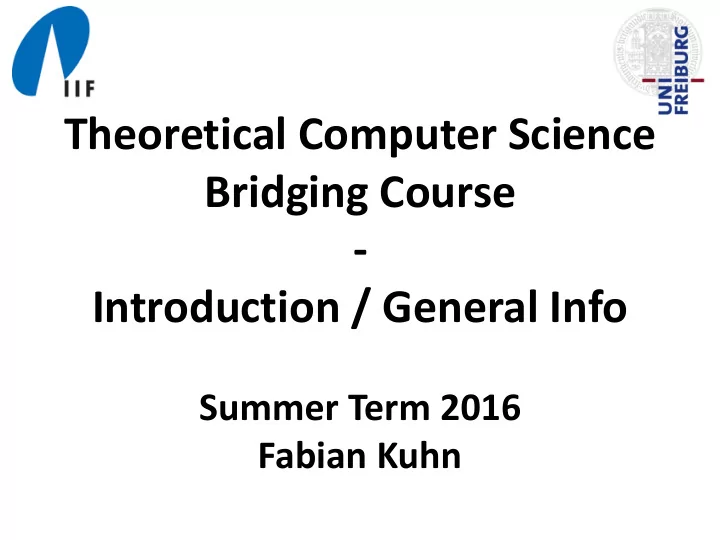

Theoretical Computer Science Bridging Course - Introduction / General Info Summer Term 2016 Fabian Kuhn
About the Course Topics • Foundations of theoretical computer science • Introduction to logic No lectures • There are recordings which you are supposed to watch Exercises • There will be weekly exercises which you need to do – 50% of the points are needed to be admitted to the exam • You can work in groups of 2 or 3 students Exam • A written exam at the end of the term – Details will be published on the course web page a.s.a.p. TCS Bridging Course – SS 2016 Fabian Kuhn 2
About the course What is the purpose of the course? Who is it targeted to? • The course is for incoming M.Sc. students who do not have the necessary theory background required by the M.Sc. program. – E.g., students who did not study computer science or students from more applied schools, ... TCS Bridging Course – SS 2016 Fabian Kuhn 3
Website • All necessary information about the course will be published on http://ac.informatik.uni-freiburg.de/teaching/ss_16/tcs-bridging.php – Or go to my group’s website: http://ac.informatik.uni-freiburg.de – Then follow teaching – summer term 16 – TCS bridging course • Please check the website for – Recordings and slides – Exercises and sample solutions – Pointers to additional literature (e.g., written lecture notes from an older version of this lecture) – Information about the exam – … TCS Bridging Course – SS 2016 Fabian Kuhn 4
Exercises There will be weekly exercise sheets: • Exercise sheets are published at the latest on Monday on the website • Exercises are due after one week on the coming Monday by midnight • Hand in your exercises electronically (by email) to your tutor • For the exercises, you can build groups of at most 3 students • Each group needs to hand in one solution – Make sure that all students in the group participate in the writing equally! • After handing in the exercises, you need to meet and discuss the exercises with your tutor TCS Bridging Course – SS 2016 Fabian Kuhn 5
Exercise Tutorials Tutors for the course: • Chaodong Zheng, chaodong@cs.uni-freiburg.de • Anisur Rahaman Molla, anisur.rahaman@cs.uni-freiburg.de Weekly Tutorials: • You need to meet your tutor once a week – Each group can schedule the weekly meeting individually • In the tutorial, you need to explain your solutions to your tutor! • Also ask your tutor if you have any questions! TCS Bridging Course – SS 2016 Fabian Kuhn 6
Exercises The exercises are the most important part of the course! • To pass the exam, it is important that you do the exercises • If you feel comfortable with all the exercises, you should also be able to pass the exam • You therefore need to achieve 50% of the points to be admitted to the exam! • When working in groups, make sure that you all participate in solving the questions and in writing the solutions! – You will all need to explain your solutions to your tutor. TCS Bridging Course – SS 2016 Fabian Kuhn 7
Course Topics Foundations of Theoretical Computer Science • Automata theory • Formal languages, grammars • Turing machines • Decidability • Computational complexity Introduction to Logic • Propositional logic • First order logic TCS Bridging Course – SS 2016 Fabian Kuhn 8
Purpose of the Course Goal: Understand the fundamental capabilities and limitations of computers • What does it mean to “compute”? – Automata theory • What can be computed? – Theory on computability/decidability • What can be computed efficiently? – Computational complexity TCS Bridging Course – SS 2016 Fabian Kuhn 9
Meaning of “Computing” Mathematical Models • Turing machines 1930s • Finite state automata 1940s • Formal grammars 1950s Practical Aspects • Compute architectures 1970s • Programming languages 1970s • Compilers 1970s TCS Bridging Course – SS 2016 Fabian Kuhn 10
Is My Function Computable? Write an algorithm / computer program to compute it • Can it compute the right answer for every instance? • Does it always give an answer (in finite time)? • Then you are done. Otherwise, there are two options • There is an algorithm, but you don’t know it • There is no algorithm the problem is unsolvable Formally proving computability is sometimes hard! • But you will learn how to approach this… TCS Bridging Course – SS 2016 Fabian Kuhn 11
Is My Function Computable? • Many “known” problems are solvable – Sorting, searching, knapsack, TSP, … • Some problems are not solvable – Halting problem – Gödel incompleteness theorem • Don’t try to solve unsolvable problems! TCS Bridging Course – SS 2016 Fabian Kuhn 12
Can I Compute My Function Efficiently? • Some problems are “easy” – Can we formally define what this means? • Complexity theory is about this – Complexity classes, tools for checking membership • It is important to know how hard a problem is! • Feasible problems: – E.g., sorting, linear programming, LZW compression, primality testing, … – Time to solve is polynomial in the size of the input • Problems that are considered infeasible – Some scheduling problems, knapsack, TSP, graph coloring, … – Important open question: “Is P = NP ”? • Unfeasible problems – Time exponential in input, e.g., quantified Boolean formula TCS Bridging Course – SS 2016 Fabian Kuhn 13
Questions? TCS Bridging Course – SS 2016 Fabian Kuhn 14
Recommend
More recommend